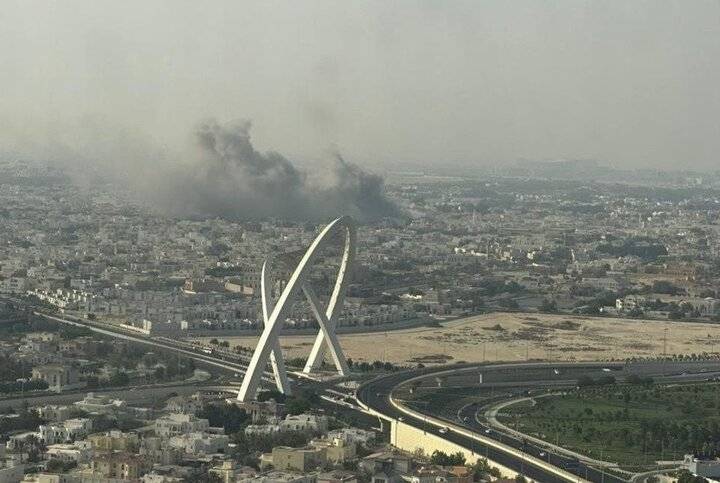3213 Views
Israel’s Strategic Blunder: How the Doha Strike Is Reshaping Regional Order
On September 9, 2025, the Zionist regime, in a blatant violation of Qatar’s national sovereignty, carried out an airstrike in the heart of the Qatari capital, Doha. The operation, targeting the headquarters of Hamas’ political leadership, was not only an assault on the sovereignty of an independent UN member state, but also a dangerous turning point in Israel’s aggressive pattern that has put the stability and security of the entire Middle East at risk.
The Israeli strike, launched at the peak of diplomatic efforts to establish a ceasefire in Gaza, clearly demonstrated that Tel Aviv recognizes no limits for its operations. This strategic blunder by Israel risks expanding the flames of war from Gaza’s borders to the entire region.
Israel’s Widespread Aggression
For years, the Zionist regime, emboldened by the unconditional backing of its international partners, has freely struck wherever it pleases. This aggressive trajectory—previously witnessed in Lebanon, Syria, Iraq, and even Iran—was elevated to an entirely new level with the attack on Qatar, a country with broad diplomatic ties and home to U.S. military bases.
The strike on such a state shocked even seasoned observers and revealed that no country is safe from Israeli aggression. This action constitutes a flagrant violation of Article 2 of the UN Charter, which prohibits the use of force against the territorial integrity or political independence of any state. It represents yet another example of Tel Aviv’s blatant disregard for the fundamental principles of international law. Israel’s sweeping aggression not only threatens regional stability, but also cements Prime Minister Benjamin Netanyahu’s government as an unpredictable and destabilizing force in the international order.
Targeting Hamas’ Political Leaders in Doha
The timing and location of the strike underscored its calculated intent to derail diplomacy. The attack occurred precisely as Hamas’ political leaders were finalizing their review of a ceasefire proposal put forward by Egyptian and Qatari mediators. This was no coincidence—it was a deliberate move to eliminate any possibility of agreement.
By striking political figures—who, unlike combatants on the battlefield, are entitled to immunity—Tel Aviv committed yet another war crime, signaling its determination to pursue an unrelenting war effort. The targeting of political leadership outside a battlefield context underscores Israel’s willingness to deploy any means to dismantle the infrastructure of resistance.
Sabotaging the Diplomatic Track
With this strike, Israel effectively destroyed the political dialogue and months of mediation by Qatar and Egypt. The attack sent a clear message to all regional and international actors: Tel Aviv has no faith in diplomacy and prefers to manage crises through military escalation and violence. This was not a miscalculation—it was a strategic choice.
This choice undermined Qatar’s credibility as a trusted mediator and shattered the confidence required to revive negotiations in the near future. The immediate consequences are the continuation of war, rising civilian casualties in Gaza, and deepening regional divisions.
Strategic Implications for the Region’s Future
Perhaps the most significant consequence of the strike is a paradigm shift in regional security thinking. Until this act of aggression, some Arab states believed that normalization or mediation roles could shield them from Israel’s assaults. The attack on Qatar shattered this illusion, proving that Tel Aviv’s belligerence knows no bounds.
Israel’s miscalculation has inadvertently strengthened the discourse of collective security in the region. More than ever, states are realizing that individual deterrence against a law-breaking regime is insufficient; only a unified security framework can provide protection. This could drive greater convergence among states that had previously been divided over how to confront Israel.
At the same time, Israel’s aggression has a direct impact on the cohesion and strategy of the Axis of Resistance. With Israel slamming the door on diplomacy, resistance groups across the region—from Lebanon and Yemen to Iraq and Palestine—are convinced that armed struggle and active deterrence remain the only viable options. The attack has lent greater legitimacy to the resistance narrative, paving the way for expanded operational and strategic coordination among its members.
Global reactions were predictable. While there was widespread condemnation from Islamic states, the Arab League, and some European countries, the implicit backing of the United States once again highlighted the UN Security Council’s and international institutions’ inability to curb Israeli aggression. This double standard has deepened distrust in the current global order and is pushing regional actors toward indigenous solutions.
Conclusion
Israel’s strike on Doha was more than an act of state terrorism—it was a miscalculation with far-reaching consequences. By targeting Hamas’ political leadership, Israel not only destroyed the negotiation process but also demolished the last bridges toward a political solution. The attack sowed deep seeds of mistrust across the region and turned the creation of a regional coalition for collective security into an urgent necessity.
In the short term, Tel Aviv may claim a tactical success. But in the long run, by uniting its adversaries and isolating itself diplomatically, it has suffered a major strategic defeat. The Middle East after the Doha strike is pregnant with transformations in which the balance of power will shift against Israel’s aggressive and unilateral policies.
Translated by Ashraf Hemmati from the original Persian article written by Mohammad Saleh Ghorbani

Comment
Post a comment for this article